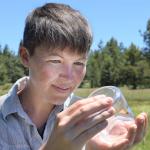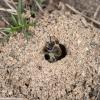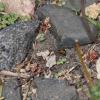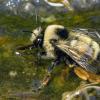The Xerces Society is delighted to announce the winners of this year’s DeWind Awards. Every year, the DeWind Committee selects at least two students engaged in the field of Lepidoptera (moth and butterfly) conservation to receive an award to support their research. The DeWind Awards were established by Bill DeWind in honor of his wife, Joan Mosenthal DeWind, an early member of the Xerces Society with a keen interest in butterflies and supporting young entomologists.
This year, both winners are pursuing their doctoral degrees. Based at the University of Nevada, Reno, Christopher Halsch, will use the funds to support his research examining the interactive effects of pesticide exposure and climate change on a widespread butterfly, the common checkered-skipper (Pyrgus communis). Insects, including butterflies, face numerous stressors across large geographic areas. Although interactive effects are expected, their impacts are not well understood. This laboratory experiment will give insights into the isolated and interactive effects of pesticide exposure and climate change, which can help inform future management plans for this and other common and widespread butterflies.

[Left] Chris Halsch studies a mourning cloak while monitoring butterflies in the Sierra Nevada. (Photo: Jennifer Sande, provided by Christopher Halsch). [Right] Common checker-skipper, the subject of Halsch’s DeWind-supported research. (Photo: Alan Schmierer [CCO 1.0].)
Our other winner, Wendy Valencia-Montoya, is based at Harvard University. Wendy will evaluate the impact of limestone mining on three cycad-feeding Eumaeus butterflies in Colombia. All three species of these butterflies in Colombia are obligate feeders on Zamia cycads, which are critically endangered. Information gathered from this study will be helpful for making recommendations for maintaining habitat connectivity and identifying areas of greatest conservation concern.

[Left] Wendy Valencia-Montoya beside a Zamia obliqua producing a flush of new leaves. [Right] Caterpillar of Eumaeus minyas (sometimes called the minyas cycadian) on Zamia incognita. (Photos courtesy Wendy Valencia-Montoya, used with permission.)
Further Reading
DeWind Awards are given out annually. The 2022 cycle will open in November 2021. If you or someone you know is a student pursuing research related to Lepidoptera conservation, please consider applying or sharing the word!
For more information about the DeWind Awards, please review these Frequently Asked Questions.
Read more about previous awardees and their projects.




